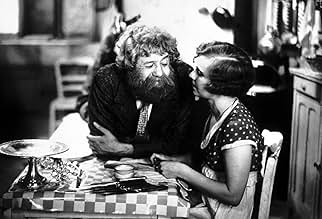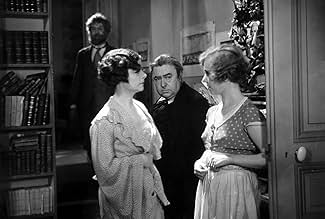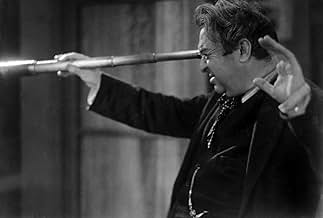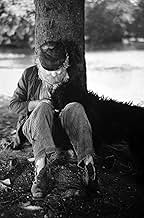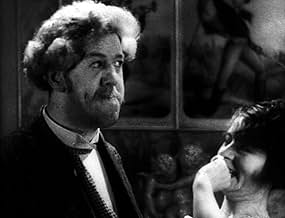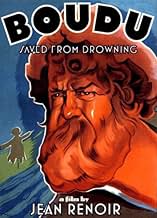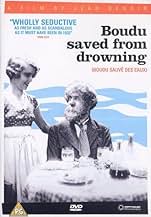CALIFICACIÓN DE IMDb
7.2/10
6.5 k
TU CALIFICACIÓN
Agrega una trama en tu idiomaA bookseller saves a tramp from drowning and shelters him, but the tramp's odd behavior starts to wear everyone down.A bookseller saves a tramp from drowning and shelters him, but the tramp's odd behavior starts to wear everyone down.A bookseller saves a tramp from drowning and shelters him, but the tramp's odd behavior starts to wear everyone down.
Charles Granval
- Édouard Lestingois
- (as Charles Granval de la Comédie Française)
Jacques Becker
- Le poète
- (sin créditos)
Georges D'Arnoux
- Un invité à la noce
- (sin créditos)
Régine Lutèce
- La promeneuse
- (sin créditos)
Jane Pierson
- Rose, la voisine
- (sin créditos)
- Dirección
- Guionista
- Todo el elenco y el equipo
- Producción, taquilla y más en IMDbPro
Opiniones destacadas
I really enjoy watching old Michel Simon films. When I find one of his films, I always QUICKLY grab it and watch it as soon as possible. That's because even if the film isn't that great, his performance is always very interesting and quite unusual. My favorite film of his is Drôle de drame (1937), but he did several others that are among my favorites.
Well, once again Simon's performance makes this film worth watching. While in this case his acting is NOT subtle or perhaps as high quality as he's done in other films (it's a bit over-the-top), it's fun to just turn off your mind and watch the silliness. This film will not change your life and is a pretty insignificant film but still good to watch nonetheless. I think, for me, the reason I didn't enjoy the film more is that the character of Boudu is a pretty awful person and I just couldn't buy that he was such a sexual dynamo that he was able to make these women forget how crude, selfish and disgusting he was just by turning on the old libido!
So my verdict is that this is a good film that you can watch only if you suspend disbelief. Oh, and I forgot to mention, director Renoir did a great job on the film. For a 1931 French film, the sound and camera work are superb--something you DON'T see in many other films from this country until the later 1930s--he was truly ahead of his time.
Well, once again Simon's performance makes this film worth watching. While in this case his acting is NOT subtle or perhaps as high quality as he's done in other films (it's a bit over-the-top), it's fun to just turn off your mind and watch the silliness. This film will not change your life and is a pretty insignificant film but still good to watch nonetheless. I think, for me, the reason I didn't enjoy the film more is that the character of Boudu is a pretty awful person and I just couldn't buy that he was such a sexual dynamo that he was able to make these women forget how crude, selfish and disgusting he was just by turning on the old libido!
So my verdict is that this is a good film that you can watch only if you suspend disbelief. Oh, and I forgot to mention, director Renoir did a great job on the film. For a 1931 French film, the sound and camera work are superb--something you DON'T see in many other films from this country until the later 1930s--he was truly ahead of his time.
Boudu (Michel Simon), a tramp, jumps into the Seine. He is rescued by Mr. Lestingois, a gentle and good bookseller, who gives shelter to him. Mrs. Lestingois and the maid Anne-Marie (Mr. Lestingois' mistress) are far from delighted, for Boudu is lazy, dirty and salacious...
Pauline Kael called it, "not only a lovely fable about a bourgeois attempt to reform an early hippy...but a photographic record of an earlier France." The film was remade in 1986 for an American audience as "Down and Out in Beverly Hills", directed by Paul Mazursky.
Now, I don't know that Boudu is a hippie. That might be an insult to him, and it is certainly an insult to hippies. But there's plenty of comic potential in wealthy people trying to reform the slobs of the world. This theme is addressed in other films, such as "Trading Places", and the comedy writes itself.
Pauline Kael called it, "not only a lovely fable about a bourgeois attempt to reform an early hippy...but a photographic record of an earlier France." The film was remade in 1986 for an American audience as "Down and Out in Beverly Hills", directed by Paul Mazursky.
Now, I don't know that Boudu is a hippie. That might be an insult to him, and it is certainly an insult to hippies. But there's plenty of comic potential in wealthy people trying to reform the slobs of the world. This theme is addressed in other films, such as "Trading Places", and the comedy writes itself.
..sorry from the river.but it's important to bear in mind that Boudu is a metamorphosis of Legrand,the hero of Renoir's precedent work "la chienne" ,who became a tramp at the end of that movie.And like Nana in Renoir's eponymous silent movie adapted from Zola,he rose from the waters ("sauvé des eaux" is the exact meaning of the name "Mosis")to shake the well meaning bourgeoisie.A bourgeoisie where a piano is in the house because you must have one even if you do not play the piano. Almost thirty years before Luis Bunuel ("Viridiana" 1961) ,Renoir denounces the bourgeois charity ,which is a great weight off our guilty minds.Boudu is revolutionary,like Moliere's "Tartuffe" ,he squeezes Lestingois dry,but he knows from the start he will not be part of them .He refuses conventions,marriage is the worst of them all.These final sequences ,where Renoir made the best use of "blue Danube" I know (with Kubrik's "2001",but in a diametrically opposite way),are the key of the movie.Boudu looks like,at the end of the movie, like some distant cousin of Charlie Chaplin ,but a Chaplin who would have discovered cynicism.
Needless to say,"Boudu" would not be "Boudu" without Michel Simon's extraordinary presence.Such an actor does not exist anymore in French contemporary cinema.And his filmography is full of treasures.To think that he also worked with Duvivier,Carné,Clair,Decoin and so many more..
Remakes "down and out in Beverly Hills" with Nick Nolte and Bette Middler. "Boudu" ,by Gérard Jugnot,this very year. Are they necessary?
Needless to say,"Boudu" would not be "Boudu" without Michel Simon's extraordinary presence.Such an actor does not exist anymore in French contemporary cinema.And his filmography is full of treasures.To think that he also worked with Duvivier,Carné,Clair,Decoin and so many more..
Remakes "down and out in Beverly Hills" with Nick Nolte and Bette Middler. "Boudu" ,by Gérard Jugnot,this very year. Are they necessary?
This is a difficult film to review succinctly. I didn't really enjoy it, but the film is well-made, well acted, and the underlying message is still poignant. At the time, "Boudu Saved from Drowning" was quite controversial, with Michel Simon's portrayal of the antisocial, uncompromised tramp (Boudu) inciting audiences to actual riot. (In fact, the film was apparently pulled from theaters by French police several days into its screening). Essentially, "Boudu Saved from Drowning" is an attack on liberalism, as well as a sort of black satire about societal class differences. Through their interaction with Boudu, a stereotypical Burgeouise family showcase the consequences of liberal idealism, as their efforts to help and reform Boudu all backfire unpredictably. Boudu is an irredeemable, unchangeable, and uncompromised outsider and he is happy as such. In the words of Jean Renoir, "...Micheal Simon was more than a tramp. He was the personification of all tramps." In other words, the lower class. Michel Simon does a great job with the part and the Boudu character is memorable. However, the rest of the characters are unlikeable (e.g. a perverse, overweight philanderer; his unabashed housekeeper mistress, a caustic wife, etc.) and the film's narrative is just, well, stuffy. I'd probably appreciate a film like this much more at 60 than I do at 30. For a film from 1931, "Boudu" does seem pretty fresh and the print looks terrific. Nonetheless, I didn't find "Boudu" very engaging. I can't recommend this one. ---|--- Reviews by Flak Magnet
Grief-stricken from the loss of his dog, tramp Boudu throws himself into the river to end his woes, only to be pulled out by kindly book-shop-owner Edouard Lestingois and given shelter in his home. The Lestingois family take silent pride in the good deed they are doing in rescuing and perhaps reforming this tramp but Boudu himself seems singularly ungrateful and retains his own approach to life even now surrounded by the middle-class ideal.
I am sort of conflicted on this film in regards my take on it. On one hand it is generally regarded as a classic while also being "of its time" in some aspects so the pressure is on me to join the "intelligent" voice of praise and also put down anything I didn't "get" to being of time and period. But then on the flip of that, the film as a story or commentary just didn't really work for me. I understand the challenge to the idea of Chaplin's genial little tramp but the message from the film is not delivered as well as it could have been and as such it didn't work that well. If the film is meant to be a dig at the pompous middle-class then it missteps by focusing so much Boudu's wild behaviour instead of making more of his inability to accept the trimmings of this ridiculous middle-class world. By not bringing out this middle-class world, Renoir prevents the viewer from doing that.
So the message then seems to suggest that some people prefer to life this wilder life and to try and change them is pointless. By my standards this is a point that I would need more convincing on and it isn't helped by being done in a comedic and farcical way such as it is. Perhaps though I am reading too much into it and it is just meant to be a broad class-clash farce? If it is then it is certainly broad because the lack of strongly formed commentary on either the poor or the middle-classes means that we get lots of aping rather than barbed physical comedy. It certainly has a light air of comedy to it that is amusing but it is rarely really funny or enjoyable.
Where the film is impressive though is in the direction. Renoir takes affectionate and "strolling" approach to his shots of Paris. Not going for full-on tourist stuff so much as he just lets Paris "be" around his film. Better still is his work in and around the house, specifically some of his shots where he films from one side of the house, through rooms and windows into the where the action is really interesting and effective shots that prevent it feeling like a sound-stage and create the idea that this is all real. The cast are solid enough for the material. Everyone loves Simon so I guess again I am alone on that. For my tastes he is just too broad and obvious in his Boudu he feels like he is acting in a silent movie because all his actions are big and telegraphed and he is too excessive in all aspects to win me over with rough charm. Gravval, Hainia and others are actually better as they have more grounded characters to deliver and thus have more of interest for me.
I'm open to being criticised on this because I appreciate that most people are falling over themselves to praise this and even those with issues with it seem to follow up with "but" in their reviews. However for me the story and content just didn't work and what it left was a sort of broad farce that didn't have any commentary teeth and wasn't funny or charming enough to get away without them. Technically it was engaging and impressive in the direction of the camera but otherwise I was really very disappointed with it for what it didn't manage to do.
I am sort of conflicted on this film in regards my take on it. On one hand it is generally regarded as a classic while also being "of its time" in some aspects so the pressure is on me to join the "intelligent" voice of praise and also put down anything I didn't "get" to being of time and period. But then on the flip of that, the film as a story or commentary just didn't really work for me. I understand the challenge to the idea of Chaplin's genial little tramp but the message from the film is not delivered as well as it could have been and as such it didn't work that well. If the film is meant to be a dig at the pompous middle-class then it missteps by focusing so much Boudu's wild behaviour instead of making more of his inability to accept the trimmings of this ridiculous middle-class world. By not bringing out this middle-class world, Renoir prevents the viewer from doing that.
So the message then seems to suggest that some people prefer to life this wilder life and to try and change them is pointless. By my standards this is a point that I would need more convincing on and it isn't helped by being done in a comedic and farcical way such as it is. Perhaps though I am reading too much into it and it is just meant to be a broad class-clash farce? If it is then it is certainly broad because the lack of strongly formed commentary on either the poor or the middle-classes means that we get lots of aping rather than barbed physical comedy. It certainly has a light air of comedy to it that is amusing but it is rarely really funny or enjoyable.
Where the film is impressive though is in the direction. Renoir takes affectionate and "strolling" approach to his shots of Paris. Not going for full-on tourist stuff so much as he just lets Paris "be" around his film. Better still is his work in and around the house, specifically some of his shots where he films from one side of the house, through rooms and windows into the where the action is really interesting and effective shots that prevent it feeling like a sound-stage and create the idea that this is all real. The cast are solid enough for the material. Everyone loves Simon so I guess again I am alone on that. For my tastes he is just too broad and obvious in his Boudu he feels like he is acting in a silent movie because all his actions are big and telegraphed and he is too excessive in all aspects to win me over with rough charm. Gravval, Hainia and others are actually better as they have more grounded characters to deliver and thus have more of interest for me.
I'm open to being criticised on this because I appreciate that most people are falling over themselves to praise this and even those with issues with it seem to follow up with "but" in their reviews. However for me the story and content just didn't work and what it left was a sort of broad farce that didn't have any commentary teeth and wasn't funny or charming enough to get away without them. Technically it was engaging and impressive in the direction of the camera but otherwise I was really very disappointed with it for what it didn't manage to do.
¿Sabías que…?
- TriviaFrench audiences were outraged by Boudu's antisocial behavior to the extent that police had to be called to several theaters to restore order. In some areas the film was immediately pulled because of its polarizing effect.
- Citas
Chloë Anne Marie, la bonne: Why have a piano if no one plays it?
Édouard Lestingois: Even so, we have a piano because we are respectable people.
- Versiones alternativasThere is an Italian DVD edition of this movie, distributed by DNA Srl. The movie was re-edited with the contribution of the film history scholar Riccardo Cusin. This version is also available in streaming on some platforms. This DVD also contains another movie by Jean Renoir: Toni (1935).
- ConexionesEdited into Histoire(s) du cinéma: Seul le cinéma (1994)
- Bandas sonorasGénérique
Performed by Raphaël
Selecciones populares
Inicia sesión para calificar y agrega a la lista de videos para obtener recomendaciones personalizadas
- How long is Boudu Saved from Drowning?Con tecnología de Alexa
Detalles
- Fecha de lanzamiento
- País de origen
- Idioma
- También se conoce como
- Boudu Saved from Drowning
- Locaciones de filmación
- Berges de la Seine, París, Francia(Exterior)
- Productoras
- Ver más créditos de la compañía en IMDbPro
Taquilla
- Total a nivel mundial
- USD 2,805
- Tiempo de ejecución
- 1h 25min(85 min)
- Color
- Relación de aspecto
- 1.19 : 1
Contribuir a esta página
Sugiere una edición o agrega el contenido que falta

